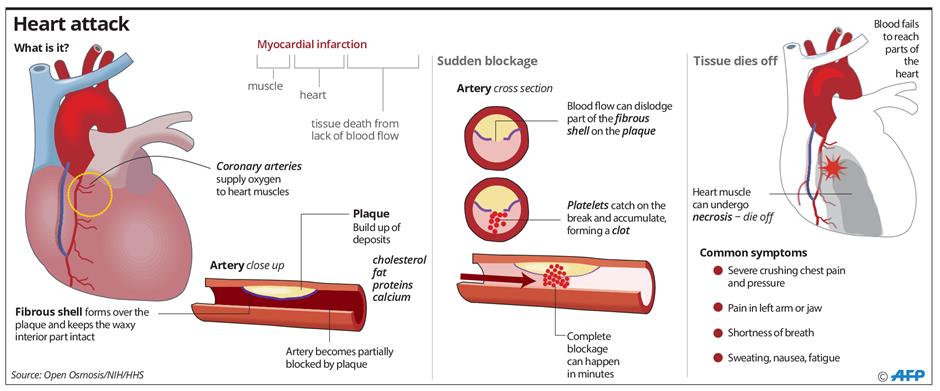
The use of partially hydrogenated oil to lengthen the shelf-life of commercially produced cookies and cakes increases trans fat content. — Filepic
A general argument often endorsed in the media suggests that intake of any saturated fat should be reduced due to potential links to high risks of coronary heart disease (CHD).
In an interview with Global Oils & Fats Business Magazine, University of Cambridge, United Kingdom, Global Cardiovascular Health senior research associate Dr Rajiv Chowdhury discusses his latest findings on saturated fats and cardiovascular disease, and the new debate on fats and nutrition.
He explains his views on these broad assumptions that were based on somewhat inconsistent evidence.
He also expresses the need for public health practitioners to better inform consumers about the significant health risks associated with consuming trans fats.
Your study, published in the Annals of Internal Medicine, generated a lot of interest. Can you explain the findings of the study?
Our meta-analysis, published in March 2014, investigated how fatty acids consumption or circulating composition might be related to future risk of CHD.
In our analyses, we included estimates from observational studies that measured “total” fatty acids from dietary intake; observational biomarkers studies that looked at “individual” fatty acid subtypes; and randomised controlled trials of fatty acid supplementation.
Taken together, this quantitative review combined data from 72 unique studies involving over 600,000 participants from approximately 20 countries.
First, we considered results on dietary total fatty acid intake from 32 prospective studies (with 512,420 participants).
We found essentially nil associations for total saturated, monounsaturated and omega-6 polyunsaturated fatty acids with CHD, whereas intake of long-chain omega-3 polyunsaturated fatty acids was associated with lower CHD risk, and intake of trans fatty acids was associated with higher CHD risk.
Second, we considered results on individual circulating fatty acid subtypes from 17 prospective biomarker studies (with 25,721 participants).
We found a significant inverse association between margaric acid and CHD, and non-significant positive associations of palmitic and stearic acids with CHD.

According to Dr Rajiv Chowdry, the meta-analysis found no significant association for total or composite saturated fats in the diet with the risk of heart disease.
We found some evidence that circulating levels of eicosapentaenoic and docosahexaenoic acid (the two main types of long-chain omega-3), and arachidonic acid, were each associated with lower CHD risk.
Third, we considered 27 randomised controlled trials of fatty acid supplementation or replacement (with 105,085 participants).
In aggregate, these trials have not suggested clear benefits after supplementation with alpha-linolenic acid or with long-chain omega-3 fatty acid, or replacement of saturated fats with omega-6 polyunsaturated fatty acid.
Could you explain the findings in layman’s terms, for those of our readers who are not medical scientists?
In our review, by combining data from published population-based studies, we found no significant association for total or composite saturated fats in the diet with the risk of heart disease.
However, when we examined subtypes of saturated fats in blood, different individual subtypes seemed to associate differently with risk, indicating perhaps all saturated fats may not be created equal when it comes to their health effects.
Additionally, we observed a strong association for higher trans (or artificial) fats with high risk of heart disease.
We also found specific polyunsaturated fats to be beneficial in observational studies; however, these findings were less consistent with those in the trials.
More research is needed to examine the food sources and health effects of specific fatty acid subtypes.
What was your motivation for looking into this area of interest?
Since the landmark Seven Countries Study report was published by Dr Ancel Keys back in the 1960s, a significant number of epidemiological and interventional studies have investigated the intriguing association between fatty acids and cardiovascular risk.
This large body of evidence has shaped nutritional guidelines worldwide, which generally encourage low consumption of saturated fats, high consumption of omega-3 polyunsaturated fatty acids from fish or plant sources, and avoidance of trans fats, particularly those from partially-hydrogenated fat.
We, however, noted considerable inconsistencies in the evidence.
For example, many prior prospective observational studies had questioned whether there really are significant associations bet-ween saturated fats intake and cardiovascular disease.
Nonetheless, these conventional dietary observational studies were limited by potential misclassification in the self-reported questionnaires used to capture fat consumption, and importantly, by their inability to compute intake of specific fatty acid subtypes.
This more specific latter assessment is, however, essential since fatty acid composite groups (such as total saturated fats) have many subtypes that vary greatly in their food sources and subsequent health effects.
Fatty acid biomarker studies, in this respect, may provide more accurate assessment of fatty acid consumption and metabolism.
This gives us the opportunity to assess risk by individual subtypes.
While several studies assessed biomarkers of individual fats in relation to CHD risk, they were generally small studies, and were never systematically reviewed and meta-analysed.
Finally, we noted that with respect to randomised trials of fatty acid supplementation for preventing coronary artery disease, interpretation of the results has been complicated by the differences in participant-level or study-level circumstances.
Therefore, to help clarify these uncertainties in both available observational and intervention studies, we conducted our comprehensive meta-analysis.
The debate around nutrition is complex, including the ones on saturated fats, sugar and carbohydrates. What do you feel are the key points that need to be addressed?
When it comes to the individual effect of fats, the principal reason why saturated fats have been considered harmful is their detrimental effects on low-density (or bad) lipoprotein (LDL) cholesterols in blood, observed in the earlier metabolic ward trials.
Nonetheless, these trials also reported that saturated fats tended to enhance high-density (or good) lipoprotein (HDL) cholesterols and apo-A1, and reduce Lp(a) concentrations – all of which are potentially beneficial circumstances for lowering the risk of CHD.
Therefore, judging the effect of a nutrient on disease risk through its effect on a single intermediate factor may not be optimal.
It is also crucial to appreciate that the traditional crude grouping of fatty acids (such as “total” saturated fats) is less helpful.
This is because when specific fatty acid subtypes are examined, associations for these individual fats seem to vary significantly within each broad fatty acid family considered.
For example, recent evidence indicates that while odd-chain saturated fat subtypes (which correlate with dairy products) are beneficial for cardiometabolic health, even-chain saturated fat subtypes (which correlate with refined carbohydrates, sugary drinks and alcohol consumption, among others) tend to raise this risk.
This suggests that food sources of specific fatty acid subtypes might be more important to determine subsequent disease susceptibility, rather than any composite fatty acid group alone.
Finally, based on the available evidence from observational studies that assessed substitution effects of various nutrients, a key aspect to consider is what we are replacing the saturated fats with.
It is often the case that when food manufacturers take out fats from food products, they replace them with carbohydrates from refined grain or sugar.

These refined carbohydrates get digested in our body rapidly, causing blood sugar and insulin levels to first rise and then dip, leading in turn to hunger, overeating and weight gain.
Over time, these can enhance the risk of CHD.
Therefore, when foods such as red or processed meats are reduced, they should perhaps be replaced with oily fish, nuts, beans and healthy oils.
There is an ongoing debate around the world about limiting trans fats. Do you feel there is an adequate understanding of the dangers of trans fats?
One of the key findings that we reported in our Annals review was a significant strong positive association of trans (or artificial) fats in diet with CHD risk (meta-analysing data from more than 150,000 participants from five long-term observational studies).
This is in line with the key nutritional guidelines that encourage avoidance of trans fats consumption.
Eating trans fats raises bad cholesterol, reduces good cholesterol, and promotes inflammation and loss of optimal endothelial function in humans – all of which are car- diotoxic.
Since there are absolutely no known requirements for trans fats for our body functions, the consumption of trans fats should be kept as minimal as possible.
While mandatory inclusion of the trans fats content in food labels has helped Western consumers identify and avoid products with trans fats content, and encouraged many food manufacturers to reduce inclusion of trans fats in their products,
I believe, however, that greater awareness worldwide is needed to inform members of the public and health practitioners about the significant health risks associated with consuming this artificial bad fat.
Palm oil is well-known as a replacement for trans fats in many foodstuffs. Is replacement of trans fats generally seen as a positive move by the scientific community?
There is little doubt, given the current evidence base, about the significant detrimental effect of trans fats on health, and the fact that this harmful artificial fat in food should be replaced by a healthier, natural alternative.
Therefore, complete removal or replacement of trans fats from food products is definitely viewed as the right move forward.
However, when it comes to replacement, the scientific community appears to be somewhat divided on which alternative should be used to replace trans fats optimally.

Natural choices such as palm oil are generally higher in even-chain saturated fat content than other plant oils.
However, they seem to be less harmful than partially hydrogenated oil high in trans fats.
In dietary intervention studies, comparing a palm oil-rich diet with diets rich in trans fats yields significant higher levels of HDL cholesterol and apolipoprotein A-I, and significantly lower apolipoprotein B, triacylglycerols, and TC/HDL cholesterol.
Do you plan to conduct further research in this area, and what other questions do you feel need to be looked into?
There should be more research to better understand individual and substitution effects of specific fat subtypes (and their food sources) on clinical cardiovascular outcomes, since the majority of previous work focused on intermediate factors (such as lipids).
This is also true for palm oil since the majority of studies that looked at palmitic acid (the predominant fatty acid in palm oil) in blood in relation to CHD generally included a few hundred coronary outcomes; were not optimally adjusted for a wide range of potential dietary and non-dietary confounding factors; and none were carried out in non-Western populations (where levels of palm oil consumption is high).
Such studies are required to definitively answer which natural and healthier cooking oil is best suited to replace artificial trans fats for coronary disease reduction worldwide.
We are currently working on several large-scale observational studies of CHD incidence involving both Europeans and South Asians to answer some of these intriguing questions.
Would you be able to tell us a little more about these new studies, and when you would expect them to be published?
We are presently working on data from a large pan-European cohort, and a large South Asian cohort looking at specific fatty acids in relation to a large number of coronary disease outcomes.
We expect preliminary results to be available potentially by the middle of 2016.
Source : www.star2.com



